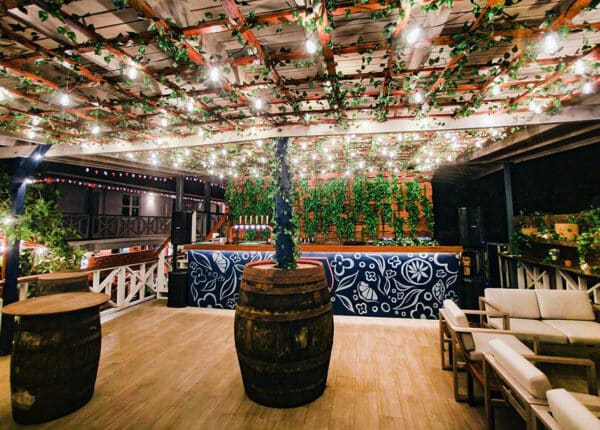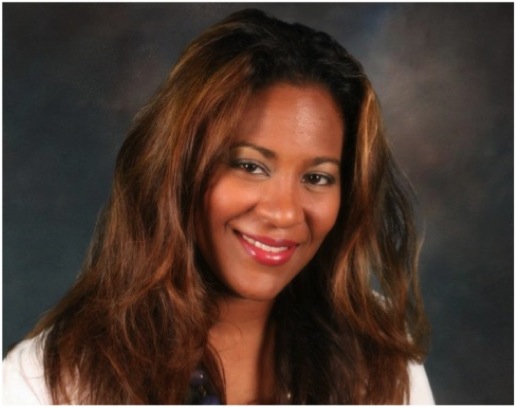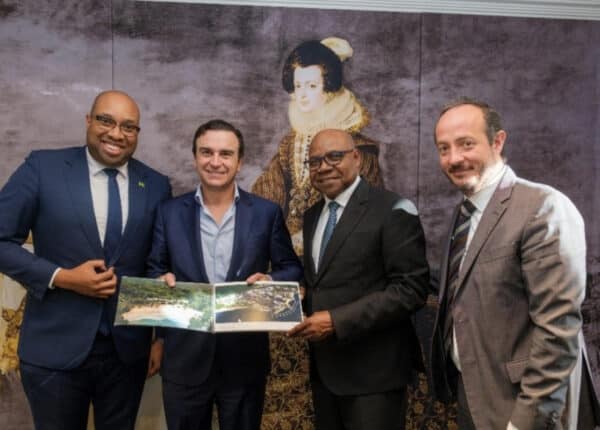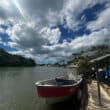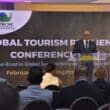Interview with Jamaican Parliamentary Candidate Dr Saphire Longmore
By Alexander Britell
Dr Saphire Longmore is the Jamaica Labour Party candidate for Eastern St Andrew in the upcoming election in the country Dec. 29. Longmore, who recently completed her MD in psychiatry, is also a former Miss Jamaica Universe and one of a new generation of young Jamaicans entering the political scene. She’s also one of 13 female candidates running this year for the JLP. Longmore, who also sits on the board of the Jamaica Social Investment Fund, is facing off against People’s National Party candidate and businessman Andre Hylton, a fellow newcomer to politics. To learn more, CJ Politics talked to Longmore about her campaign, the promise of medical tourism in the country and solving the economic issue.
How is your campaign going so far?
It’s very good so far. I got a late start, but I think I’ve covered quite a lot of ground in that time. I’ve met a lot of my constituents, and I’ve been focused on talking to the people, hearing what their needs are and trying to formulate solutions. In terms of my future plans for the constituency, I’ve gotten some good feedback so far.
How would you describe the tenor of politics in Jamaica?
To be very honest, the political atmosphere has come a far way, in terms of not being very violent, and not being very physically aggressive. There are still some amount of verbal exchanges, but even that has tempered a lot, and that is kind of the reason why I decided to enter the political scene at this point. I think there’s a huge transformation that’s going on in Jamaican politics – for the better – in terms of the prominence of young persons, notwithstanding the presence of older individuals, because we do value their experience and the advice and guidance they can offer, and even their new ideas. But I think we’ve seen where young persons are getting an opportunity who are vibrant, and have new ideas and new methods of getting the job done. Those persons are now getting the opportunity to come in to the scene. So I’m very happy, but I’m still very cautious, because it’s a very critical election, and next year is our 50th year of independence, and both political parties would want to be the ones to celebrate that — separate and apart from the very important issue of managing our economy and seeing the changes that need to happen to see Jamaica actualize its potential.
I think there’s a huge transformation that’s going on in Jamaican politics.”
What is the biggest issue facing Jamaica today?
The very big issue facing Jamaica right now, which of course faces a lot of countries, not just in the Caribbean but the world over – is the economic situation. It’s the world over – in Europe and America – and that is going to affect us in the Caribbean basin. Fortunately, the JLP administration has weathered the storm in the past three years — the government has done quite a lot to stabilize the economy, despite what was going on externally. Our tourism, instead of going down, actually improved, and as compared to other countries in the region. I think that’s a tremendous accomplishment. But going forward, we still have to increase our GDP – we still have to be more self-sufficient, we have to reduce our imports, and our import bill. Because we need to start producing more to become more self-sustaining, and to create jobs around these industries that are not based in government service, but based in manufacturing, in industry and produce, especially agri-produce. Those are huge potential areas for growth. There are a lot of young, bright scholars, very qualified in these areas, and it would be good to see them get an opportunity. On a personal level, as a doctor, there’s medical tourism – there is a lot of potential there. Also, developing tourism, not just in traditional areas, but within Kingston and St Andrew, the corporate areas, because we have some treasures within these more cosmopolitan areas that I think tourists would find more appealing. The main challenges are economic, infrastructure development, job creation, unemployment and also developing social services, education, healthcare and security – those are the main issues right now.
You mentioned medical tourism – what kind of potential can it have, and what should be done to grow it?
Well, there’s huge potential – both in recuperative, post-operative care, going right back to rehabilitative care, along with detox centres and wellness centres — not just for persons who are already ill, but also preventive medicine, in terms of creating centres for relaxation, therapy and anti-aging therapy. We have so many health spas and healing spas here in Jamaica that we would focus our attention around. There’s a wonderful one in in Clarendon, which is fantastic, with world-renowned healing and a sulfur-based healing spa, with hot spring water which people speak tremendously about, and the powers of relief they get from ailments such as arthritis, but primarily skin conditions and heart conditions. We have quite a few other baths such as that out in St Thomas in Trelawny. We have huge potential in terms of the mountainous areas, in terms of creating resorts for getaways and relaxation therapy. If you really want to get in the more hard-core medical side of things, we have tremendous physicians here. Compared to their first-world countries, they might be significantly less in cost, but the quality is very much up there. So there’s huge potential that could be harnessed in Jamaica. In my own constituency, we have the University Hospital of the West Indies, which is the premier teaching hospital for medical sciences throughout the Caribbean, and that could be something that could create the institutions to develop medical tourism formally. So there’s huge potential for medical tourism here in Jamaica.
One of the first priorities Prime Minister Holness mentioned was dismantling the garrisons in Jamaica. What do you think about that problem and what should be done about it?
Well, dismantling the garrisons is a tremendous task, because of how ingrained it is in our political structure. However, I think we are all recognizing, primarily led by Prime Minister Holness, that we need to enhance the lives of persons in these communities. We need to enhance them mentally, spiritually, physically and socially. We need to see to it that persons are educated, ensure that they are provided with housing. We need to ensure that they’re provided with meals – literally, the need to go and align yourself with gangs and political groups because of some unmet basic necessity needs to be recognized and addressed. The JLP has a strong programme called the Community Renewal Programme, which addressed exactly this. It targets primarily the crime-ridden areas in Kingston and St Andrew, and some of the outlying parishes. We target the female heads of households, unattached at-risk youth and other at-risk populations. So basically it’s the persons who are falling through the gaps, who are unemployed, who have no basic skills training. This programme is to provide basic skills, to provide literacy and universal skill training and to enhance training for job creation, mentorship and volunteerism and entering into job banks for work experience. There is definitely a plan to address these garrison communities, and the need is that we have to move this country forward, and to recognize that we cannot move forward as a country if we do not address this very basic and obvious need of the people who are in these somewhat at-risk communities. We have to address that, and I think Prime Minister Holness expressed that, and has invited the opposition to join him in these efforts, and we’re still hoping they will do so.
The garrisons are part of a wider crime problem – how can that situation be improved?
I know that the general trend has been a reduction in the number of murders, at this point in time, and there has been a reduction in the number of serious crimes. I think the police force, in the last year and a half, has made some targeted efforts into directly addressing some of the gang communities, especially in the parishes of Clarendon, St Catherine, Kingston and St Andrew. I think the community policing forces have also been enhanced, where they’ve developed a relationship with the people in the community. That has gone a far way in enhancing an overall reduction in the crime rate. There’s still a lot of need for improvement. It’s still too high, and it’s not necessary – I think it’s something that, once we deal with some of the social issues, like the garrison communities, I think we could see a reduction in the overall crime situation throughout Jamaica. We need to address the issue of young people, because major crimes are committed by young males under 30, and if we can find avenues to find gainful employment, to seek some sort of avenue in terms of their interest, and their motivation, I think we will be way ahead of the game. One of the reasons why I think we would want to continue as an administration, is to continue some of the programmes that we have started and that have been shown to be effective, to have some continuity. Now is not the time to break the trend.
We’ve been speaking to candidates about Jamaica’s progress on Caribbean integration. What do you think about that, and what can be done to move forward?
Well, CARICOM has been established for a number of years now. I think we have a lot of dreams, in terms of where we want to see the Caribbean go forward. Inspired by the success of the University of the West Indies, and how collaborative and successful a venture that was, in terms of bringing the Caribbean together – and it is still a very strong, vibrant institution that continues to grow, I would hope that we would reach that in terms of our economic policy development, or our regional growth as a group together. I think that in our world environment, we all recognize that we have to be unified – our small little island states are going to be lost, especially with the bigger economies that are on lock now.
I think that in our world environment, we all recognize that we have to be unified – our small little island states are going to be lost.”
We also recognize what happened in Europe in terms of the Euro, because of the lack of cohesion and transparency. We are now seeing an unevenness in terms of the economic stability of the individual countries. I think we also need to learn our lessons from that, in terms of ensuring that where we’re going, there is an equal undertaking and footing in terms of how we bear the weight, proportional to what our requirements and our needs and desires are. At the same time, as a Caribbean community that we all identify with internally, we need to ensure that we are recognized as such, and recognized as a unified group.
